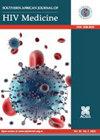‘At this [adherence] club, we are a family now’: A realist theory-testing case study of the antiretroviral treatment adherence club, South Africa
IF 1.6
4区 医学
Q4 INFECTIOUS DISEASES
引用次数: 14
Abstract
Background An estimated 7.9 million people were living with HIV in South Africa in 2017, with 63.3% of them remaining in antiretroviral therapy (ART) care and 62.9% accessing ART. Poor retention in care and suboptimal adherence to ART undermine the successful efforts of initiating people living with HIV on ART. To address these challenges, the antiretroviral adherence club intervention was designed to streamline ART services to ‘stable’ patients. Nevertheless, it is poorly understood exactly how and why and under what health system conditions the adherence club intervention works. Objectives The aim of this study was to test a theory on how and why the adherence club intervention works and in what health system context(s) in a primary healthcare facility in the Western Cape Province. Method Within the realist evaluation framework, we applied a confirmatory theory-testing case study approach. Kaplan–Meier descriptions were used to estimate the rates of dropout from the adherence club intervention and virological failure as the principal outcomes of the adherence club intervention. Qualitative interviews and non-participant observations were used to explore the context and identify the mechanisms that perpetuate the observed outcomes or behaviours of the actors. Following the retroduction logic of making inferences, we configured information obtained from quantitative and qualitative approaches using the intervention–context–actor–mechanism–outcome heuristic tool to formulate generative theories. Results We confirmed that patients on ART in adherence clubs will continue to adhere to their medication and remain in care because their self-efficacy is improved; they are motivated or are being nudged. Conclusion A theory-based understanding provides valuable lessons towards the adaptive implementation of the adherence club intervention.“在这个[坚持]俱乐部,我们现在是一个家庭”:对南非抗逆转录病毒治疗坚持俱乐部的现实主义理论测试案例研究
2017年,南非估计有790万艾滋病毒感染者,其中63.3%仍在接受抗逆转录病毒治疗,62.9%获得抗逆转录病毒治疗。护理保留率低和抗逆转录病毒治疗依从性不佳破坏了使艾滋病毒感染者开始接受抗逆转录病毒治疗的成功努力。为了应对这些挑战,抗逆转录病毒坚持俱乐部干预措施旨在简化抗逆转录病毒治疗服务,以“稳定”患者。然而,人们对坚持俱乐部干预如何、为什么以及在什么卫生系统条件下起作用知之甚少。本研究的目的是测试一个理论,关于在西开普省的初级卫生保健机构中,坚持俱乐部干预是如何以及为什么起作用的,以及在什么样的卫生系统环境中起作用。方法在现实主义评价框架内,采用验证性理论检验案例研究方法。Kaplan-Meier描述用于估计依从性俱乐部干预的退出率和病毒学失败率,这是依从性俱乐部干预的主要结果。定性访谈和非参与性观察用于探索背景,并确定使观察到的结果或行为持续存在的机制。根据推理的还原逻辑,我们使用干预-情境-行为者-机制-结果启发式工具配置了从定量和定性方法获得的信息,以制定生成理论。结果:我们证实,在坚持俱乐部接受抗逆转录病毒治疗的患者会继续坚持他们的药物治疗并继续接受治疗,因为他们的自我效能得到了改善;他们要么被激励,要么被鞭策。结论基于理论的认识为依从性俱乐部干预的适应性实施提供了宝贵的经验。
本文章由计算机程序翻译,如有差异,请以英文原文为准。
求助全文
约1分钟内获得全文
求助全文
来源期刊
CiteScore
2.80
自引率
11.80%
发文量
41
审稿时长
>12 weeks
期刊介绍:
The Southern African Journal of HIV Medicine is focused on HIV/AIDS treatment, prevention and related topics relevant to clinical and public health practice. The purpose of the journal is to disseminate original research results and to support high-level learning related to HIV Medicine. It publishes original research articles, editorials, case reports/case series, reviews of state-of-the-art clinical practice, and correspondence.

 求助内容:
求助内容: 应助结果提醒方式:
应助结果提醒方式:


